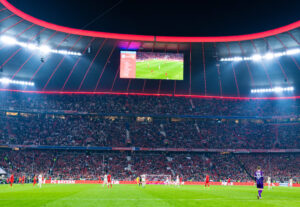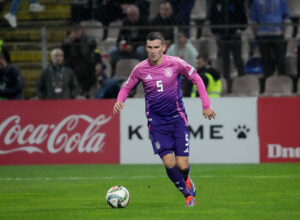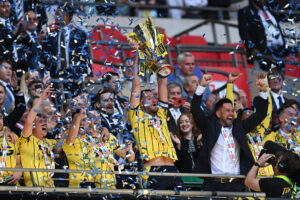After just two wins from 46 Bundesliga matches, a Schalke relegation was inevitable, and it was sealed with a 1-0 loss to newly-promoted Arminia Bielefeld on April 20.
In just the third campaign since their second-place finish in 2017/18, the Royal Blues’ 29-year stay in Germany’s top tier has come to an end. Their relegation sends a warning to all big clubs, that even as arguably the third largest club in the country behind Bayern Munich and Borussia Dortmund, years of neglect, mismanagement and transfer market ineptitude can result in falling out of the league.
Despite having played twice more than two of the bottom four, they cannot catch Hertha Berlin in the relegation playoff spot with four matches remaining.
Schalke Relegation Confirmed
Season of Turmoil
Since the COVID-19 enforced break of 2020, Schalke have endured one of the worst runs in living memory, failing to secure a win in the nine-match stretch that remained when the Bundesliga resumed, and to this day only managing two victories from 30 league outings in 2020/21. The Royal Blues have dismissed four managers from the hot seat since the resumption of football, largely behind closed doors, and seem to be heading into a second-tier campaign as unstably as they entered this one. Even with that torrid end to the 2019/20 season, the club stuck with David Wagner and that faith was not repaid despite digging their own holes in the summer window.
Considering their calamitous application this term, their 12th placed finish in 2019/20 was not as below par as the reaction suggested. With key players in Weston McKennie, Daniel Caligiuri and Jonjoe Kenny not adequately replaced, and the bizarre loaning out of 29-time Germany international Sebastian Rudy to Hoffenheim, a squad that was trending dramatically in the wrong direction was further weakened.
When eyebrow-raising moves for veteran strikers in Vedad Ibisevic and Klaas-Jan Huntelaar, the latter joining in January, combined with injury-prone Portuguese talent Goncalo Paciencia saw their attacking contingent leave a lot to be desired. The work rate and guile from McKennie in central areas heightened by the dip in creativity from the loss of Caligiuri left a gaping hole in the side that has looked like second-tier fodder all season long.
Amine Harit has struggled to shoulder the chance creation responsibility left behind and with 20-year-old American striker Matthew Hoppe the one sign of hope as the club’s top scorer with five, a mass refreshing of the squad looks on the horizon.
What now?
Five managers have failed to get a tune out of this group of players and it comes to the time when you cannot continue to point the finger upstairs. The off-pitch decisions have played an enormous role in this relegation but the squad have let their fans down, it is not a group that can wash their hands of putting only 13 points on the board at this stage of the season.
There is an apparent lack of leadership and trust in every crevice of the club. Ralf Rangnick snubbed their advances for him to be the man to take them straight back up next term so they must look for a plan B, current gaffer Dimitros Grammozis has a contract running until the end of next season but is without a promotion on his managerial CV.
There is a strong chance that two of Koln, Hertha Berlin and Mainz will join them in the 2. Bundesliga next season and with the likes of Hamburg, Fortuna Dusseldorf and Hannover already down there, it is not going to be a walk in the park. If they can bring in a manager with experience and know-how at the level combined with a huge shaking up of the squad they give themselves the best chance.
A club as big as Hamburg are enduring their third season in the second tier, you must finish in the top three of the 18 team league to have a shot at promotion, as it stands Schalke have a long way to go before calling themselves a Bundesliga club once again.
Main Photo






